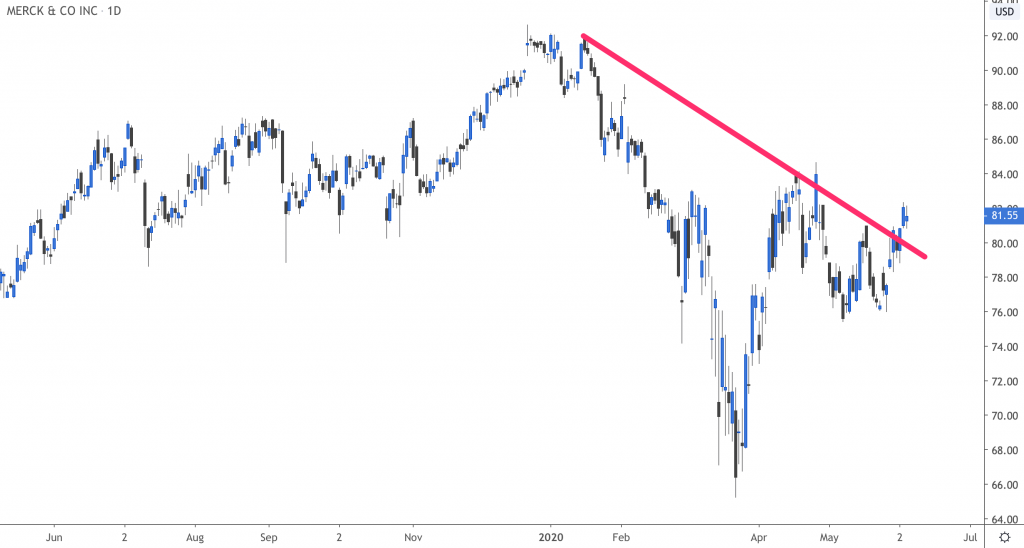These 2 stocks look like they’re headed for more upside.
The healthcare sector has been outperforming lately, and more upside appears to be on the horizon.
The XLV S&P 500 Healthcare Sector ETF has gained 36% since the March 23 bottom and now sits just -3% below its January high.
“Long term, we’re bullish on the sector as the demographics in the U.S. are aging and this will allow health insurers to demand higher premiums,” said Todd Gordon, managing director of Ascent Wealth Partners. “In light of everything that’s happened with COVID-19 almost pushing the economy into depression, there’s obviously going to be a greater focus on health care going forward.”
Strategic Wealth Partners president Mark Tepper agrees the group is heading higher, and likes one stock in particular in the sector.
“My favorite would be Bristol-Myers (NYSE: BMY),” Tepper said this week. “Bristol-Myers has lagged the healthcare sector by about 6% this year. The reason I like it is it is a pure play on cancer – let’s not forget cancer is still the number one medical problem in the world.”
Bristol-Myers got a boost last month when it delivered a Q1 earnings beat, reporting a 13% increase in revenue to $10.8 billion, and earnings per share of $1.72 – ahead of analysts’ estimates for $1.49.
“The strength of our financial results and pipeline progress in the first quarter reflect continued successful execution across the company,” said CEO Giovanni Caforio in a statement. “We are well positioned to continue to successfully drive commercial execution of our inline business, launch new brands, progress our integration effort, and deliver our synergy targets while advancing our pipeline.”
Morgan Stanley analyst David Risinger recently raised his rating on Bristol-Myers to Overweight, given strong demand for its arthritis drug Orencia and cancer immunotherapy Opdivo. In its acquisition of Celgene last year, the pharma giant also got the blockbuster cancer drug Revlimid.
According to Risinger, Bristol-Myers’ “prospects are solid, and it’s on the the least expensive major pharmaceutical companies.”
“The valuation is cheap,” Tepper added. “The stock is trading at 10 times forward earnings with a [price-to-earnings growth] ratio of less than 1. They’ve got a strong pipeline and they’re finally getting their swagger back as well.”
Newton Advisors’ Mark Newton has his eye on a different stock in the space.
“Merck (NYSE: MRK) is one of the pharmas that has been underperforming of late and now recently started to show a lot of signs of good technical strength,” Newton said. “We have actually broken a four-month downtrend in the stock.”

While Merck shares are down more than -10% year-to-date, the stock has gained 3% over the last week.
“The stock is back up over May highs right near $82, but the fact is it’s still 10% under its highs that it hit earlier in the year. So, that makes it appealing to me as the stock starts to gain momentum,” Newton added. “The stock has carved out really a giant long-term base, and the pullback that we’ve seen over the last few months actually has not undercut its longer-term uptrend even from 2009. So that makes it appealing to me.”
Risinger also likes Merck and says the stock could hit $89.
The analyst believes Merck’s solid growth prospects remain undervalued. With a 30-times multiple on its earnings from vaccines like Pneumovax and the human papillomavirus-preventative Gardasil, and a 25-times multiple on its animal-health earnings, Riesinger said that implies just a single-digit earnings multiple for Merck’s drug unit. It’s Keytruda immunotherapy treatment is also the world’s second-biggest drug.
The stock got a boost last week when Merck said it was entering the coronavirus fray with two experimental vaccines and one experimental treatment.
“Our scientists have been engaged and focused on COVID-19 from the time we learned about it,” said Merck CEO Ken Frazier. “We’re very excited. We think we have a good chance of making these things work.”